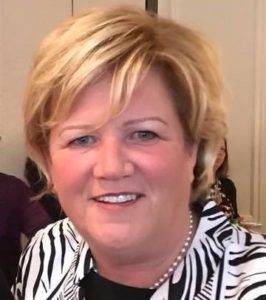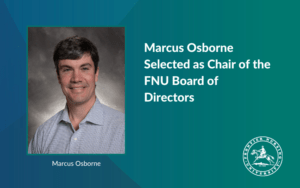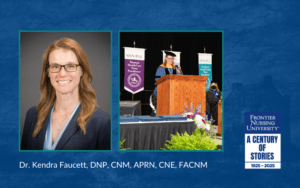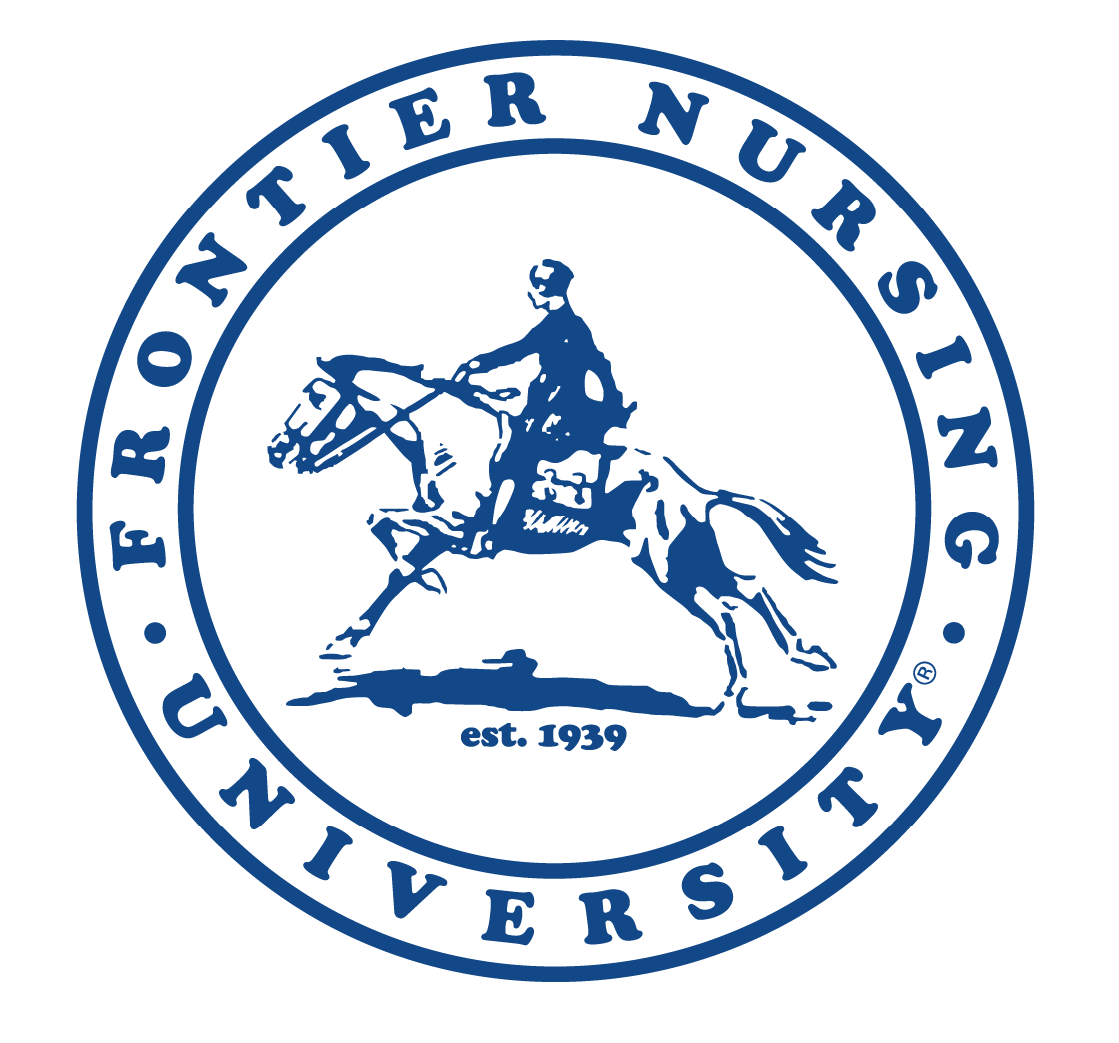 Last month, Frontier Nursing University (FNU) proudly announced that Dr. Catherine Collins-Fulea, DNP, CNM, FACNM, Assistant Professor at FNU, had been inducted as the new president of the American College of Nurse-Midwives (ACNM). She succeeds FNU President Dr. Susan Stone, DNSc, CNM, FACNM, FAAN, as ACNM’s president. ACNM is the professional association that represents certified nurse-midwives (CNMs) and certified midwives (CMs) in the United States.
Last month, Frontier Nursing University (FNU) proudly announced that Dr. Catherine Collins-Fulea, DNP, CNM, FACNM, Assistant Professor at FNU, had been inducted as the new president of the American College of Nurse-Midwives (ACNM). She succeeds FNU President Dr. Susan Stone, DNSc, CNM, FACNM, FAAN, as ACNM’s president. ACNM is the professional association that represents certified nurse-midwives (CNMs) and certified midwives (CMs) in the United States.
Dr. Collins-Fulea has been an active member of ACNM for all of her career. During her time with ACNM, she has chaired multiple committees, developed and implemented the organization’s benchmark system, and served two terms as vice president. Additionally, in 2003, the ACNM Foundation presented her with the prestigious Dorthea Lang Pioneer Award in recognition of her vital contributions to the group.
In 2018, Dr. Collins-Fulea obtained her Doctor of Nursing Practice from FNU and joined FNU as an assistant professor in January 2019.
This week we had the honor of sitting down with Dr. Collins-Fulea to learn a little more about her journey to her position as ACNM President, her passion for nurse-midwifery, and what goals she has for the future of ACNM and the midwifery community as a whole.
Where did your passion for nurse-midwifery begin?
I grew up in Canada but ended up attending nursing school in Oxford, England after hearing about the program through one of my father’s friends. Truthfully, getting involved with nurse-midwifery was a complete accident; I needed another elective in order to practice in Canada or America and I chose nurse-midwifery with no idea of the impact it would have on the rest of my life.
In England, I had been socialized to believe that everyone is delivered by a nurse-midwife. There were no power struggles with the doctors…that’s just how it was done. When I got my first nursing job in Detroit, I saw an American culture where giving women a spinal or telling them to cross their legs to postpone birth while waiting for a private doctor to conduct the delivery was common. I hated that model, and I only lasted six months before realizing that what I really wanted to do was practice and promote nurse-midwifery in the United States.
So although I wasn’t called to nurse-midwifery in the same way that many of my colleagues were, I am extremely passionate about the practice. I had been educated in a culture that collectively agreed upon the value of nurse-midwifery and when I came here and saw the hurdles American nurse-midwives were facing, I knew I needed to make a difference.
What has been your career path so far and how has it led you to your current role as faculty at FNU?
After I completed the mandatory refresher course in nurse-midwifery that was a prerequisite to sitting for the American boards, I became the fourth practicing nurse-midwife in the state of Michigan in 1981. I then opened an in-hospital birth center at Grace Hospital in Detroit. I was able to grow that practice to three nurse-midwives, but the hospital wasn’t willing to commit to any further expansion so I began to look elsewhere.
In 1991, I teamed up with the Henry Ford Health System (HFHS) to open a practice with six other nurse-midwives. The HFHS stood firmly with us through some initial opposition as we worked to create a cohesive culture between doctors and nurse-midwives. During my 27 years with the HFHS, it grew from seven to 22 midwives who served a network of two hospitals and eight different outpatient clinics. As we extended the reach of midwives in the area, we also worked to educate the healthcare community on the importance of our work. We taught nurse-midwifery students as well as OB-GYN residents, and we quickly saw the benefits of training side-by-side. The OB-GYN students learned to respect nurse-midwifery, became educated on our model of care, and almost all of them would go on to work with or hire nurse-midwives in the future.
December 27, 2018, I delivered my last baby before joining FNU. I had first heard about FNU in 1991 when I became a preceptor for someone from the school’s first nurse-midwifery distance education class. I have since worked with many FNU students and graduates and was confident that FNU would be a great fit for me. I graduated from FNU in December of 2018 and joined the faculty of FNU’s doctorate program in January of 2019. The flexible hours of teaching work perfectly with my new role as ACNM president. I love mentoring the DNP students through their quality improvement initiatives and I am so grateful that I am able to both teach and lead ACNM.
What are you most excited about with your new role as ACNM president?
I am most excited about working toward being an inclusive organization and continuing to work toward an environment of belonging where everyone is welcome and feels a responsibility to the greater midwifery community. We have a lot of great minds conducting research on maternal mortality and morbidity, the ability to practice, barriers to practice and so much more. I believe the next step is uniting every midwife in the United States to feel that vital sense of belonging and acceptance, so that is where I would really like to focus.
Now more than ever, we need to focus our efforts on listening to midwives who have experienced racism within midwifery education, within their personal lives, and even within ACNM. I am committed to turning any exclusive agenda around and making sure that everyone feels that they have a place in our community. It won’t be easy, and it won’t happen overnight, but one way or another, my biggest goal is to set us on the path forward to equality within our organization and the greater nurse-midwifery community.
What are the biggest challenges that you will face in your new role as ACNM president?
I think the biggest hurdle is going to be convincing each individual nurse-midwife how important it is that everyone feels valued and accepted. No matter how big our goals are, if we don’t have that basic foundation, we simply won’t be as effective as we could be. When we all work together with a sense of belonging and purpose, more people are going to want to get involved and be willing to donate precious time and energy towards our goals.
This goes hand in hand with the second obstacle of convincing those who aren’t members of ACMN to join us. The more members we have, the stronger our voice can be. In the 70s and 80s, ACNM had a lot more people willing to get involved because if we didn’t stand up and volunteer for the nurse-midwifery community, we weren’t going to be able to practice. I think we have grown more comfortable in recent years. There are not as many barriers to practice now, but it is always important to the future of nurse-midwifery that we organize together. We need people to volunteer; if they don’t have the time to volunteer, we also appreciate financial support. When we are able to work together using the expertise that everyone brings to the table, we will truly thrive.
What is a fun fact about you?
I have a motorcycle license. My husband bought a Harley Davidson and I decided if he could do it, I could do it. I took lessons and I bought myself a little Suzuki.
Thank you for answering the call to service, Dr. Collins-Fulea! The Frontier community is excited to be under your leadership and see how you will continue to positively impact the world of nurse-midwifery in this new role. Interested in learning more about Dr. Collins-Fulea? Go here to read about her induction.
What is a Certified Nurse-Midwife (CNM)?
Certified Nurse-Midwives (CNMs) are educated in two disciplines: midwifery and nursing. They earn graduate degrees, complete a midwifery education program accredited by the Accreditation Commission for Midwifery Education (ACME), and pass a national certification examination administered by the American Midwifery Certification Board (AMCB) to receive the professional designation of CNM. Certified Midwives (CMs) are educated in the discipline of midwifery. They earn graduate degrees, meet health and science education requirements, complete a midwifery education program accredited by ACME, and pass the same national certification examination as CNMs to receive the professional designation of CM.











 Carrie Belin is an experienced board-certified Family Nurse Practitioner and a graduate of the Johns Hopkins DNP program, Johns Hopkins Bloomberg School of Public Health, Georgetown University School of Nursing, and Johns Hopkins School of Nursing. She has also completed fellowships at Georgetown and the University of California Irvine.
Carrie Belin is an experienced board-certified Family Nurse Practitioner and a graduate of the Johns Hopkins DNP program, Johns Hopkins Bloomberg School of Public Health, Georgetown University School of Nursing, and Johns Hopkins School of Nursing. She has also completed fellowships at Georgetown and the University of California Irvine.












 Angie has been a full-scope midwife since 2009. She has experience in various birth settings including home, hospital, and birth centers. She is committed to integrating the midwifery model of care in the US. She completed her master’s degree in nurse-midwifery at Frontier Nursing University (FNU) and her Doctorate at Johns Hopkins University. She currently serves as the midwifery clinical faculty at FNU. Angie is motivated by the desire to improve the quality of healthcare and has led quality improvement projects on skin-to-skin implementation, labor induction, and improving transfer of care practices between hospital and community midwives. In 2017, she created a short film on skin-to-skin called
Angie has been a full-scope midwife since 2009. She has experience in various birth settings including home, hospital, and birth centers. She is committed to integrating the midwifery model of care in the US. She completed her master’s degree in nurse-midwifery at Frontier Nursing University (FNU) and her Doctorate at Johns Hopkins University. She currently serves as the midwifery clinical faculty at FNU. Angie is motivated by the desire to improve the quality of healthcare and has led quality improvement projects on skin-to-skin implementation, labor induction, and improving transfer of care practices between hospital and community midwives. In 2017, she created a short film on skin-to-skin called 

 Justin C. Daily, BSN, RN, has ten years of experience in nursing. At the start of his nursing career, Justin worked as a floor nurse on the oncology floor at St. Francis. He then spent two years as the Director of Nursing in a small rural Kansas hospital before returning to St. Francis and the oncology unit. He has been in his current position as the Chemo Nurse Educator for the past four years. He earned an Associate in Nurse from Hutchinson Community College and a Bachelor of Science in Nursing from Bethel College.
Justin C. Daily, BSN, RN, has ten years of experience in nursing. At the start of his nursing career, Justin worked as a floor nurse on the oncology floor at St. Francis. He then spent two years as the Director of Nursing in a small rural Kansas hospital before returning to St. Francis and the oncology unit. He has been in his current position as the Chemo Nurse Educator for the past four years. He earned an Associate in Nurse from Hutchinson Community College and a Bachelor of Science in Nursing from Bethel College. Brandy Jackson serves as the Director of Undergraduate Nursing Programs and Assistant Educator at Wichita State University and Co-Director of Access in Nursing. Brandy is a seasoned educator with over 15 years of experience. Before entering academia, Brandy served in Hospital-based leadership and Critical Care Staff nurse roles. Brandy is passionate about equity in nursing education with a focus on individuals with disabilities. Her current research interests include accommodations of nursing students with disabilities in clinical learning environments and breaking down barriers for historically unrepresented individuals to enter the nursing profession. Brandy is also actively engaged in Interprofessional Education development, creating IPE opportunities for faculty and students at Wichita State. Brandy is an active member of Wichita Women for Good and Soroptimist, with the goal to empower women and girls. Brandy is a TeamSTEPPS master trainer. She received the DASIY Award for Extraordinary Nursing Faculty in 2019 at Wichita State University.
Brandy Jackson serves as the Director of Undergraduate Nursing Programs and Assistant Educator at Wichita State University and Co-Director of Access in Nursing. Brandy is a seasoned educator with over 15 years of experience. Before entering academia, Brandy served in Hospital-based leadership and Critical Care Staff nurse roles. Brandy is passionate about equity in nursing education with a focus on individuals with disabilities. Her current research interests include accommodations of nursing students with disabilities in clinical learning environments and breaking down barriers for historically unrepresented individuals to enter the nursing profession. Brandy is also actively engaged in Interprofessional Education development, creating IPE opportunities for faculty and students at Wichita State. Brandy is an active member of Wichita Women for Good and Soroptimist, with the goal to empower women and girls. Brandy is a TeamSTEPPS master trainer. She received the DASIY Award for Extraordinary Nursing Faculty in 2019 at Wichita State University.  Dr. Sabrina Ali Jamal-Eddine is an Arab-disabled queer woman of color with a PhD in Nursing and an interdisciplinary certificate in Disability Ethics from the University of Illinois Chicago (UIC). Dr. Jamal-Eddine’s doctoral research explored spoken word poetry as a form of critical narrative pedagogy to educate nursing students about disability, ableism, and disability justice. Dr. Jamal-Eddine now serves as a Postdoctoral Research Associate in UIC’s Department of Disability and Human Development and serves on the Board of Directors of the National Organization of Nurses with Disabilities (NOND). During her doctoral program, Sabrina served as a Summer Fellow at a residential National Endowment of the Humanities (NEH) Summer Institute at Arizona State University (2023), a summer fellow at Andrew W. Mellon’s National Humanities Without Walls program at University of Michigan (2022), a Summer Research Fellow at UC Berkeley’s Othering & Belonging Institute (2021), and an Illinois Leadership Education in Neurodevelopmental and related Disabilities (LEND) trainee (2019-2020).
Dr. Sabrina Ali Jamal-Eddine is an Arab-disabled queer woman of color with a PhD in Nursing and an interdisciplinary certificate in Disability Ethics from the University of Illinois Chicago (UIC). Dr. Jamal-Eddine’s doctoral research explored spoken word poetry as a form of critical narrative pedagogy to educate nursing students about disability, ableism, and disability justice. Dr. Jamal-Eddine now serves as a Postdoctoral Research Associate in UIC’s Department of Disability and Human Development and serves on the Board of Directors of the National Organization of Nurses with Disabilities (NOND). During her doctoral program, Sabrina served as a Summer Fellow at a residential National Endowment of the Humanities (NEH) Summer Institute at Arizona State University (2023), a summer fellow at Andrew W. Mellon’s National Humanities Without Walls program at University of Michigan (2022), a Summer Research Fellow at UC Berkeley’s Othering & Belonging Institute (2021), and an Illinois Leadership Education in Neurodevelopmental and related Disabilities (LEND) trainee (2019-2020). Vanessa Cameron works for Vanderbilt University Medical Center in Nursing Education & Professional Development. She is also attending George Washington University and progressing towards a PhD in Nursing with an emphasis on ableism in nursing. After becoming disabled in April 2021, Vanessa’s worldview and perspective changed, and a recognition of the ableism present within healthcare and within the culture of nursing was apparent. She has been working since that time to provide educational foundations for nurses about disability and ableism, provide support for fellow disabled nursing colleagues, and advocate for the disabled community within healthcare settings to reduce disparities.
Vanessa Cameron works for Vanderbilt University Medical Center in Nursing Education & Professional Development. She is also attending George Washington University and progressing towards a PhD in Nursing with an emphasis on ableism in nursing. After becoming disabled in April 2021, Vanessa’s worldview and perspective changed, and a recognition of the ableism present within healthcare and within the culture of nursing was apparent. She has been working since that time to provide educational foundations for nurses about disability and ableism, provide support for fellow disabled nursing colleagues, and advocate for the disabled community within healthcare settings to reduce disparities. Dr. Lucinda Canty is a certified nurse-midwife, Associate Professor of Nursing, and Director of the Seedworks Health Equity in Nursing Program at the University of Massachusetts Amherst. She earned a bachelor’s degree in nursing from Columbia University, a master’s degree from Yale University, specializing in nurse-midwifery, and a PhD from the University of Connecticut. Dr. Canty has provided reproductive health care for over 29 years. Her research interests include the prevention of maternal mortality and severe maternal morbidity, reducing racial and ethnic health disparities in reproductive health, promoting diversity in nursing, and eliminating racism in nursing and midwifery.
Dr. Lucinda Canty is a certified nurse-midwife, Associate Professor of Nursing, and Director of the Seedworks Health Equity in Nursing Program at the University of Massachusetts Amherst. She earned a bachelor’s degree in nursing from Columbia University, a master’s degree from Yale University, specializing in nurse-midwifery, and a PhD from the University of Connecticut. Dr. Canty has provided reproductive health care for over 29 years. Her research interests include the prevention of maternal mortality and severe maternal morbidity, reducing racial and ethnic health disparities in reproductive health, promoting diversity in nursing, and eliminating racism in nursing and midwifery. Dr. Lisa Meeks is a distinguished scholar and leader whose unwavering commitment to inclusivity and excellence has significantly influenced the landscape of health professions education and accessibility. She is the founder and executive director of the DocsWithDisabilities Initiative and holds appointments as an Associate Professor in the Departments of Learning Health Sciences and Family Medicine at the University of Michigan.
Dr. Lisa Meeks is a distinguished scholar and leader whose unwavering commitment to inclusivity and excellence has significantly influenced the landscape of health professions education and accessibility. She is the founder and executive director of the DocsWithDisabilities Initiative and holds appointments as an Associate Professor in the Departments of Learning Health Sciences and Family Medicine at the University of Michigan. Dr. Nikia Grayson, DNP, MSN, MPH, MA, CNM, FNP-C, FACNM (she/her) is a trailblazing force in reproductive justice, blending her expertise as a public health activist, anthropologist, and family nurse-midwife to champion the rights and health of underserved communities. Graduating with distinction from Howard University, Nikia holds a bachelor’s degree in communications and a master’s degree in public health. Her academic journey also led her to the University of Memphis, where she earned a master’s in medical anthropology, and the University of Tennessee, where she achieved both a master’s in nursing and a doctorate in nursing practice. Complementing her extensive education, she completed a post-master’s certificate in midwifery at Frontier Nursing University.
Dr. Nikia Grayson, DNP, MSN, MPH, MA, CNM, FNP-C, FACNM (she/her) is a trailblazing force in reproductive justice, blending her expertise as a public health activist, anthropologist, and family nurse-midwife to champion the rights and health of underserved communities. Graduating with distinction from Howard University, Nikia holds a bachelor’s degree in communications and a master’s degree in public health. Her academic journey also led her to the University of Memphis, where she earned a master’s in medical anthropology, and the University of Tennessee, where she achieved both a master’s in nursing and a doctorate in nursing practice. Complementing her extensive education, she completed a post-master’s certificate in midwifery at Frontier Nursing University.









 Dr. Tia Brown McNair is the Vice President in the Office of Diversity, Equity, and Student Success and Executive Director for the Truth, Racial Healing, and Transformation (TRHT) Campus Centers at the American Association of Colleges and Universities (AAC&U) in Washington, DC. She oversees both funded projects and AAC&U’s continuing programs on equity, inclusive excellence, high-impact practices, and student success. McNair directs AAC&U’s Summer Institutes on High-Impact Practices and Student Success, and TRHT Campus Centers and serves as the project director for several AAC&U initiatives, including the development of a TRHT-focused campus climate toolkit. She is the lead author of From Equity Talk to Equity Walk: Expanding Practitioner Knowledge for Racial Justice in Higher Education (January 2020) and Becoming a Student-Ready College: A New Culture of Leadership for Student Success (July 2016 and August 2022 Second edition).
Dr. Tia Brown McNair is the Vice President in the Office of Diversity, Equity, and Student Success and Executive Director for the Truth, Racial Healing, and Transformation (TRHT) Campus Centers at the American Association of Colleges and Universities (AAC&U) in Washington, DC. She oversees both funded projects and AAC&U’s continuing programs on equity, inclusive excellence, high-impact practices, and student success. McNair directs AAC&U’s Summer Institutes on High-Impact Practices and Student Success, and TRHT Campus Centers and serves as the project director for several AAC&U initiatives, including the development of a TRHT-focused campus climate toolkit. She is the lead author of From Equity Talk to Equity Walk: Expanding Practitioner Knowledge for Racial Justice in Higher Education (January 2020) and Becoming a Student-Ready College: A New Culture of Leadership for Student Success (July 2016 and August 2022 Second edition).